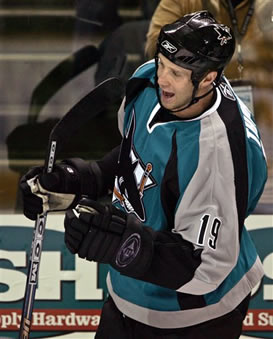

At 15, Joe Thornton was drafted into the OHL by the Sault St. Marie Greyhounds with the team's first pick, second overall. In his first season, 1995-96, Thornton was the talk of the hockey world. He won the OHL rookie-of-the-year award for his 76 points in 66 games. He was also named the Canadian Major Junior rookie-of-the-year. He was tall and wiry at 6' 4" and 180 pounds, and was known more for his quick shot and playmaking skills than his physical play. Many hockey scouts predicted that the draft class of 1997 would be one of the deepest on record and Thornton headed the list of a dozen young players from around the world that appeared to be on the track to bona fide stardom at the professional level. He began to get more and more attention, from the press, fans, and, of course, opposing players. In his second OHL season, Thornton exploded for 122 points in 59 games. He added 19 points in 11 playoff games and cemented his place at the top of his class, winning a gold medal with Canada at the 1997 World Junior Championships. He was the youngest player on the Canadian team. Boston made him the first pick in the 1997 NHL Entry Draft, surprising no one, and added another budding star, Sergei Samsonov, with the eighth overall pick. Thornton's bid to improve the team was cut short when he was injured in an exhibition game in September. A broken forearm kept him out of the young Boston lineup for the first three games of the season. Later in the year he missed 10 games with cellulitis in his ankle and another six games with a viral infection. Each time that he seemed ready to establish himself on the team and in the league, an injury would slow his progress. Boston coach Pat Burns also insisted on bringing Thornton along slowly. The young center with the curly blond hair made plenty of fans but had little impact on the scoresheet, finishing the season with only seven points in 55 games.


Thornton dedicated himself in the off season to preparing himself physically for the long grind of his second NHL season. He hit the gym and put on weight, going from just under 200 pounds to 215. The London, Ontario native went to score 41 points in 1998-99 and 60 points the following year. Over the next two years Thornton continued to put up impressive numbers, however it wasn't until the 2002-03 season that the burly centreman established himself as one of the premier players in the league. In his breakthrough season Thornton was only one of three players to notch over 100 points during the regular season, finishing the year with 36 goals and 65 assists for 101 points and was voted to the NHL's 2nd All-Star Team. In 2003-04, Thorton saw his point totals drop off (23-50-73) and the Bruins who had finished first in the Northeast, were eliminated in the first round of the 2004 Stanley Cup playoffs. Upon being eliminated from the post season, Thornton was added to Canada's entry for the 2004 World Cup of Hockey, and went on to become a key contributor for the club throughout the tournament and in their victory over Finland in the final. After suiting for HC Davos in the Swiss Elite League in 2004-05, Thornton made his second appearance at the World Championship (first was in 2001), helping Canada capture a silver medal in 2005. Following a season in Switzerland due to the NHL lockout, Thornton returned to Boston in the fall of 2005 and remained the team's captain and on-ice leader. However, with the team struggling Thornton, who had signed three year contract earlier that summer was shipped to the San Jose Sharks in exchange for Wayne Primeau, Marcu Sturm and Brad Stuart.






































































































































































